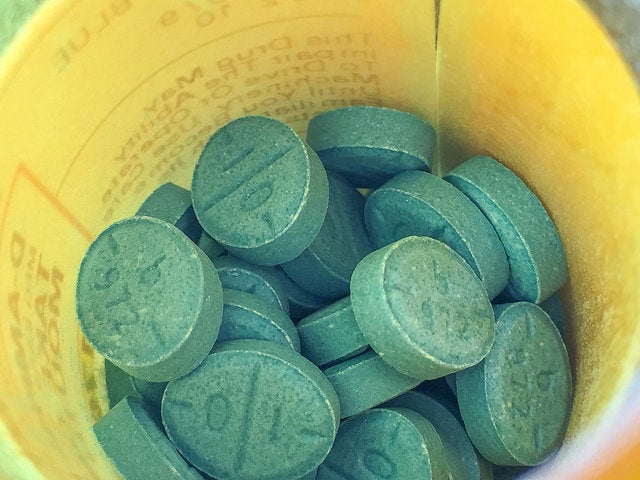Duluth-based health provider Essentia Health, which serves patients in Wisconsin, is taking part in a nationwide study to test three drugs to treat COVID-19, including the controversial drug ivermectin.
The study by doctors at Duke University is funded by the National Institutes of Health, and it’s examining whether the drugs ivermectin, fluvoxamine and fluticasone could be used to help people with mild-to-moderate cases of the disease recover more quickly.
“The reasons that we’re studying these medications are that they’re FDA approved for other indications,” said Dr. Rajesh Prabhu, an infectious disease physician at Essentia Health. “But there’s some preliminary information that maybe they’re a benefit for people who have COVID-19.”
News with a little more humanity
WPR’s “Wisconsin Today” newsletter keeps you connected to the state you love without feeling overwhelmed. No paywall. No agenda. No corporate filter.
While approved for other uses, the drugs are not currently authorized by the U.S. Food and Drug Administration for treatment of COVID-19.
Ivermectin has been the center of controversy as popular figures like podcast host Joe Rogan and conservative lawmakers like Republican U.S. Sen. Ron Johnson have touted their use to prevent or treat the virus.
Green Bay Packers quarterback Aaron Rodgers said he took ivermectin when he tested positive for COVID-19 last fall.
But the FDA has warned the drug used to treat infections from parasitic worms and other conditions could be dangerous, especially in large doses. Wisconsin health professionals and doctors have also expressed concerns over unauthorized use of the drug, including Dr. Ann Helms, a neurologist in Milwaukee and state lead for the Committee to Protect Health Care.
She said early research on the benefits of ivermectin were uncontrolled or poorly designed.
“We’re not ready yet to apply it because we don’t have the data yet,” Helms said. “And I think gathering more data is the most appropriate, which is what the NIH is funding.”
The Duke study represents a larger clinical trial with a goal of examining 15,000 people to determine with confidence whether ivermectin and other drugs could prove beneficial. The study would also be double-blind. That means both the study’s investigators and participants won’t know who’s receiving the actual drug or a placebo.
Dr. Jeff Pothof, chief quality officer for UW Health, said that helps eliminate a lot of the bias that may otherwise be present.
“To have folks studying medications, really any medications, within the confines and safety of a well-conducted clinical trial, that’s how we learn things in science,” said Pothof. “Those kinds of studies are welcome, although hard to do and time-consuming and resource-consuming.”
As the omicron variant has caused a surge in COVID-19 cases, Prabhu with Essentia Health said there’s no better time to study the effectiveness of these drugs and provide answers.
“There’s so many people that are getting infection, and there’s very limited therapeutics available for most people that develop COVID,” said Prabhu. “Everything, in general, that’s been approved so far, (you either) have to be hospitalized — that means you have a really bad case of COVID — or you have to have underlying health conditions.”
Late last year, the FDA approved emergency use authorizations for the drugs paxlovid and molnupiravir, and they’re currently only available to those at highest risk of contracting severe complications from COVID-19.
The two other drugs in the study are fluticasone, a steroid inhaler used to treat asthma, and fluvoxamine, which is used to treat depression. Prabhu said early research indicates they may have benefits for treating COVID-19 symptoms.
Even so, Prabhu and other physicians stressed that people should not take the medications outside the safety of a well-controlled clinical trial.
“As likely as there is to maybe find benefit, we don’t know if there’s benefit (to taking the drugs),” said Pothof. “It’s also possible that you’ll discover harm.”
So far, 64 people have expressed interest in taking part across Essentia’s service area in Minnesota, Wisconsin and North Dakota.
Anyone age 30 and older can take part that has mild-to-moderate COVID-19 symptoms and has tested positive within the past 10 days. Participants must have at least two symptoms of the virus for seven days or less. Symptoms include fatigue, difficulty breathing, cough, vomiting and diarrhea among others.
Participants will take either the medication or a placebo drug for the prescribed amount of time and keep track of their symptoms for 90 days through online surveys. No in-person visits are required, and the medication is shipped directly to an individual’s home at no cost.
Essentia Health has five clinics in Wisconsin in Spooner, Ashland, Hayward, Maple and Superior.
People interested in learning more can visit Essentia Health’s website, the study’s website or call 833-385-1880.
Wisconsin Public Radio, © Copyright 2025, Board of Regents of the University of Wisconsin System and Wisconsin Educational Communications Board.






